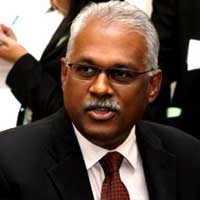Cetdem head Anthony Tan says bus and rail systems are ideal, while Charles Santiago says it should be cheaper to use transit and more expensive to use your own car.

Public transport advocates say a more efficient public transport system is needed. (Bernama pic)
PETALING JAYA: Public transport advocates have called for a review of the national transport policy to reduce the number of single-occupancy cars on the road and encourage greater use of buses and mass transit.

Charles Santiago
Charles Santiago, the incoming MP for Klang, an economist, said there should be greater incentives to persuade people to use public transport.
“What the government can do is to make public transport more affordable and owning a private vehicle more expensive,” he told FMT.
An environmental group, the Centre for Environment, Technology and Development Malaysia, called for improvements to the public transport system, preferably with a bus-centric system, to get more people out of cars and into shared transport.

Anthony Tan Kee Hua
Cetdem executive director Anthony Tan Kee Huat said a more efficient public transport system was needed, especially one that linked cities.
The fastest, he said, would be a bus-centric system.
Although the new Pan-Borneo Highway being built would be the backbone for Sabah and Sarawak, as the Plus Highway is for the Peninsula, a rail-based system was still ideal.
“What are the new government’s plans to improve existing commuter services and increase ridership of the existing MRT line? Right now it’s barely 25% of the target,” Tan told FMT.
Santiago said that, aside from connectivity, giving people an incentive to actually use public transport was also important.
He said vehicles using renewable energy should replace those based on fossil-fuel, but renewable-energy vehicles were often expensive.
Renewable energy was the way forward not only in vehicles but other aspects of life as well. “While things like hydro-energy and solar-energy is expensive at first, it will be beneficial in the end.”
Tan said the large number of motor vehicles on the road raised concerns about the amount of greenhouse gas emissions.
The International Energy Agency, in a 2017 report, forecast that there would be 62 million cars on the road in South-East Asia, up from 20 million. New car sales last year in Singapore, Indonesia, Malaysia, Thailand, Vietnam and the Philippines rose five percent to nearly 3.4 million units. -FMT


No comments:
Post a Comment
Note: Only a member of this blog may post a comment.